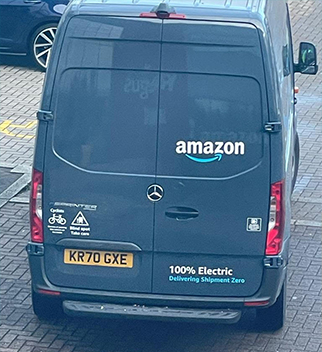With Black Friday (more like Black November this year it seemed based on how early the offer emails came flooding in) behind us and Christmas looming we thought it might be an interesting opportunity to talk about Amazon.
Love them or loathe them, they’re a huge player in the global landscape and are worth looking at in a bit more detail as they are held within Sarasin & Partner’s responsible models, through the Responsible Global Equity fund.
It’s important to note that this fund isn’t just comprised of AAA rated ESG stocks – Sarasin don’t see this as adding the most value. Instead, they adopt a thematic approach through investing in companies with improving ESG credentials. This is where Amazon fits in.
As a reminder, ESG refers to the environmental, social and corporate governance of a business. Here are some of the key ways in which Amazon are building on their ESG credentials:
Climate pledge
Amazon’s climate pledge (co-funded with Global Optimism) calls on signatories to be net zero carbon across their businesses by 2040. This is a decade ahead of the Paris Agreement goal.
Jeff Bezos, Amazon’s founder, says:
We’ve decided to use our size and scale to make a difference. If a company with as much physical infrastructure as Amazon – which delivers more than 10 billion items a year – can meet the Paris Agreement 10 years early, then any company can. Large companies signing The Climate Pledge will send an important signal to the market that it’s time to invest in the products and services the signatories will need to meet their commitments.

Amazon have launched a sustainability website to report on its commitments, initiatives and performance. The site includes information on Amazon’s carbon footprint and other sustainability metrics that share the progress the company is making towards reaching the goals set out in the climate pledge.
You can see what sustainability efforts they have in place near you with this interactive map: Amazon Around the Globe.
The map shows Amazon have ‘on-site solar’ in situ near our office in Dartford for example.
Spotted at GLC head office! A fully electric Amazon delivery van.
Bezos Earth Fund
Amazon also fund multiple other initiatives, including a $10billion pledge to combat climate change through the Bezos Earth Fund. (This makes Jeff Bezos the largest single donor tackling climate change in the US. Given reports that his fortune topped $200billion during the pandemic, this seems only fair!)
Employee conditions
You’ll have seen various reports in the media around Amazon’s workers’ rights and conditions. As the world’s largest company with over one million employees, they appear to attract more negativity than their peers. Which is why it might surprise you to hear that employees have ranked Amazon an average of almost 4 out of 5 stars in nearly 50,000 reviews on the employer ratings site Glassdoor and that Amazon pay well above what competitors offer for the same work.
Covid response
Amazon’s response to this year’s crisis has been impressive. Measures taken include:
- Hiring 175,000 people, over 75% of whom are being offered full-time, permanent employment. This is in contrast to the combined 30 million people laid off by other US companies.
- Using existing technology in their drone division to make face shields. 30,000 of them have been donated and the rest have been sold at cost on their website – cheaper than anything else available.
- Spending $300millon on testing capabilities for staff. (When no one else can test at the scale you need, you build it yourself!)
- Forecasting a total of $4billion of public healthcare spending for the benefit of their employees, the American public and the US Department of Justice.
Tax avoidance
Of course we have to address what is always going to be Amazon’s biggest elephant in the room – their tax contributions. Sarasin’s view is that this is a regulatory issue: if the tax laws were more robust then their low payments wouldn’t be allowed to happen. However, within the current system, every company who operates globally has efficient tax planning in place. It’s the Directors’ duty to ensure they preserve profits as much as possible within the regulations.
On a personal note, however you feel about Amazon – benign, charitable and climate-focussed employer or tax-dodging corporate behemoth – after the year local businesses have had, I will personally be shopping small and local wherever possible, or if that isn’t possible buying direct from other UK based companies websites.
I recently spent ages tracking down a new bike which I didn’t want to buy via Amazon or e-bay. Bikes are hard to find in 2020 due to the unprecedented demand. Google – you can’t get entirely away from big US tech firms – led me to finding one in stock with a company in the Lake District, so I gave them a ring to check a few things (such as that they did actually have one!). It turned out a year ago their website didn’t have real time stock availability, but 2020 forced them to upgrade their technology and ultimately sell a bicycle to a bloke in Kent. Well done them I say… It would have been easier to use Amazon, but I felt good when I didn’t because hopefully I have helped support a small business, even if the Lake District isn’t exactly local!